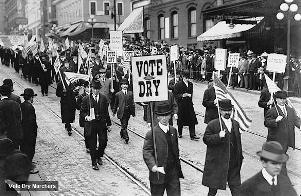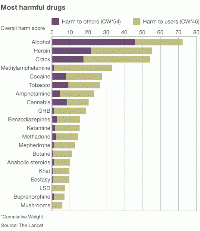Alcohol
"Should the Drinking Age Be Lowered from 21 to a Younger Age?," on ProCon.org
Did You Know? Legal Drinking Age 138 Countries, from ProCon.org
Chronicle Film Review: Prohibition
Attention Students: Start a SAFER Campus Campaign This Spring
 The SAFER Campuses Initiative is off to an early start for Spring 2011, and we want to help you get a campaign going on your campus.
The SAFER Campuses Initiative is off to an early start for Spring 2011, and we want to help you get a campaign going on your campus.
We're already helping several campuses get their efforts off the ground, and we'll continue to help them and others work to change campus policies and spark public debate about the relative safety of marijuana compared to alcohol.
The goal of the SAFER Campuses Initiative is to work with students at as many schools as possible, so please contact us today to let us know if you are interested in working with us on your campus or at one near you.
Whether you're interested in running a full-blown SAFER campaign, or simply taking action when opportunities present themselves, we want to hear from you! We will be able to provide you with a great deal of support, including instructions, materials, and direct assistance.
The SAFER movement began just five years ago on two college campuses in Colorado, and since then it has spread across the nation. Now, students at more than a dozen schools, including five of the 15 largest in the nation, have adopted SAFER referendums, calling for reductions in campus penalties for marijuana use so they're no greater than those for alcohol use. At a few of those schools, SAFER campus leaders are now working with administrators to develop and implement policy changes that reflect the student votes. Perhaps most importantly, these efforts have generated significant news coverage and discussion at the campus, local, and even national level.
If you're interested in working with SAFER on your campus or on one that's nearby, please take a minute to check out the SAFER Campuses Initiative website, then send us an e-mail and answer the following questions about yourself and your school so we can get things rolling.
1. What school are you currently attending or interested in working at?
2. Are you a member of a student organization working on marijuana policy reform? If so, which one? If not, are you interested in potentially starting one? (NOTE: being part of or starting a student organization is not required, but can be very helpful.)
3. Anything else that might be of note? A personal story? A particular skill or work/volunteer experience?
Group Calls on Elected Officials in Texas to Stop Taking Alcohol Money Until Marijuana Is Legalized (Press Release)
FOR IMMEDIATE RELEASE: December 2, 2010
CONTACT: Craig Johnson, 469-733-6769, [email protected]
DALLAS, TX Dec. 2, 2010 -- With Texas politicians collecting a significant percentage of their campaign contributions from the alcohol industry after the November election, the Safer Texas Campaign (a project of ProtectYouth.org) is renewing its call on elected representatives to stop accepting such money until Texas passes legislation allowing the regulated use and sale of marijuana as a safer alternative to alcohol.
According to campaign records provided by the nonpartisan, nonprofit FollowtheMoney.org, the five Texas politicians who have received the largest contributions from the alcohol industry are Governor Rick Perry, U.S. Senator Kay Bailey Hutchison, Lt. Governor David Dewhurst, Texas House Speaker Joe Straus, and Attorney General Greg Abbott, all have so far received a total of $1.4 million during the 2010 election cycle.
Governor Rick Perry and the Texas State Legislature passed House Bill 1199 in 2003, a bill that made it significantly easier for alcohol industry groups to pass sales initiatives in "dry" cities. Despite the tremendous social and economic cost of alcohol use on families and communities, the legislation received no opposition from law enforcement or substance abuse prevention organizations.
Since HB 1199 took effect, the Texas Alcoholic Beverage Commission reports at least 391 local alcohol sales initiatives have passed statewide (compared to only 71 initiatives approved by voters during the eight years prior to HB 1199), and the number of "dry" counties has dropped from 51 to 26.
Studies show that alcohol use contributes to aggressive and risk-taking behavior potentially leading to acts of violence, whereas marijuana use does not. The US Department of Justice's National Crime Victimization Survey reported that two-thirds of victims who suffered violence by an intimate (a current or former spouse, boyfriend, or girlfriend) reported that alcohol had been a factor and that drinking is a factor in 75 percent of domestic violence incidents involving spouses. A Harvard School of Public Health study reported in 2004 that 72 percent of college rapes nationwide occurred when the female was too intoxicated by alcohol to resist/consent.
According to the U.S. Centers for Disease Control and Prevention, the number of alcohol poisoning deaths in the United States is shockingly high, consistently between 300 and 400 each year; whereas, there are no records of deaths from marijuana poisonings.
The recent California effort towards legitimate regulation of the marijuana market, Proposition 19 (also known as the Regulate, Control & Tax Cannabis Act), was opposed by the state's largest alcohol industry group, California Beer & Beverage Distributors.
The Safer Texas Campaign states that it is not anti-alcohol, nor does it advocate the use of marijuana. "Our campaign works to address increasing public safety concerns that our state laws prohibiting the marijuana market are sending a dangerous message to the public that alcohol is more acceptable than marijuana," said Craig Johnson, coordinator of the Safer Texas Campaign. "Every objective study on alcohol and marijuana has shown marijuana is a much safer substance than alcohol to both the user and to society, so our legislators should not be driving more Texans to drink by prohibiting the safer alternative of marijuana."
More info online at http://www.SaferTexas.org
Alcohol More Harmful Than Heroin or Crack, British Study Finds
What the Pot Legalization Campaign Really Threatens: Alcohol Industry Profits (Opinion)
Alcohol Lobby Teams with Law Enforcement to Fund Anti-Marijuana Campaign (Press Release)

FOR IMMEDIATE RELEASE
SEPTEMBER 15, 2010
Alcohol Lobby Teams with Law Enforcement to Fund Anti-Marijuana Campaign
California Beer and Beverage Distributors Give $10K to “No On Proposition 19” Campaign in Attempt to Kill the Competition
CONTACT: Mike Meno, MPP director of communications …………… 202-905-2030 or 443-927-6400
WASHINGTON, D.C. — On September 7, a major new front opened up in the campaign for Proposition 19, the ballot measure to tax and regulate marijuana in California. On that day, the California Beer and Beverage Distributors made a $10,000 contribution to a committee opposing Proposition 19. Steve Fox, director of government relations for the Marijuana Policy Project and co-author of Marijuana is Safer: So why are we driving people to drink?, had the following reaction to the news:
“Unless the beer distributors in California have suddenly developed a philosophical opposition to the use of intoxicating substances, the motivation behind this contribution is clear,” Fox said. “Plain and simple, the alcohol industry is trying to kill the competition. They know that marijuana is less addictive, less toxic and less likely to be associated with violent behavior than alcohol. So they don’t want adults to have the option of using marijuana legally instead of alcohol. Their mission is to drive people to drink.”
The alcohol industry is now working hand-in-hand with the law enforcement community to keep marijuana illegal. For example, the California Police Chiefs Association has given at least $30,000 to the “No on Proposition 19” campaign, while the California Narcotics Officers’ Association has chipped in $20,500 of its own. This partnership underscores the hypocrisy among law enforcement officials opposed to Prop. 19.
“Members of law enforcement have argued against Proposition 19 by asserting, ‘We have enough problems with alcohol, we don’t need to add another intoxicating substance to the mix,’ implying that marijuana is just as bad as alcohol,” Fox continued. “But the truth is that a legal marijuana market would not add another dangerous intoxicant to the mix; rather it would provide adults with a less harmful legal alternative to alcohol.”
“In their campaign to defeat Proposition 19, members of law enforcement and the alcohol industry have joined together under an umbrella group calling themselves ‘Public Safety First.’ Sadly, by fighting to keep marijuana illegal and steering adults toward alcohol instead, they are putting public safety last,” said Fox.
With more than 124,000 members and supporters nationwide, the Marijuana Policy Project is the largest marijuana policy reform organization in the United States. MPP believes that the best way to minimize the harm associated with marijuana is to regulate marijuana in a manner similar to alcohol. For more information, please visit www.mpp.org.
####

DARE Attacks Marijuana Legalization While Praising Alcohol
[image:1 align:left caption:true]Skip Miller is the chairman of DARE America and, as you might guess, he's terrified of what could happen if marijuana becomes legal:
Do we really want to make it easier to get stoned?
Cut through the smoke and that's really what California voters will be deciding in November with Proposition 19, which would make this the only state to fully legalize marijuana — a drug with proven negative health consequences.
…
The concern with marijuana is not based on my personal disapproval or bias but upon what science tells us about the drug's effects. The science is clear: Marijuana is associated with physical and mental illness, poor motor performance and cognitive impairment. [San Jose Mercury News]
So according to Skip Miller, science compels us to keep marijuana illegal. Yet, as SAFER points out, his website takes a very different tone when it comes to alcohol:
Take a minute and think how often adults drink alcohol: a cold beer at a baseball game, a glass of Chardonnay with a piece of broiled fish, a gin and tonic on a warm day. Social drinking is an acceptable and pleasurable activity for millions of Americans. It relaxes you, curbs stress, and chases away inhibitions… [DARE.org]
Wait, what!? Although the statement goes on to acknowledge the problems associated with alcohol abuse, there's no question that DARE is going out of its way to defend recreational drinking. And I agree with every word. Teaching young people that there's nothing wrong with responsible drinking is important, even though I find it ridiculously weird that DARE, of all places, would seek to do that.
All of this just serves to highlight the mind-blowing prejudice and hypocrisy that underscores DARE's position on marijuana policy. If alcohol can be enjoyed responsibly by millions of adults, despite all the mayhem associated with it, then of course the same must be true of marijuana. On the other hand, if the potential for negative outcomes trumps the rights of responsible users, then why on earth is DARE applauding "acceptable and pleasurable" alcohol instead of insisting that science compels us to start arresting people for possessing it?
When pressed, the architects of this brainless disparity typically resort to some desperate nonsense about alcohol being accepted and familiar in our culture, as though marijuana just arrived on a boat sometime last year. These same idiots actually are the last remaining obstacle to broader social and legal acceptance of marijuana, and if only we could take away their precious beer, we'd find them at the bargaining table within 48 hours.





